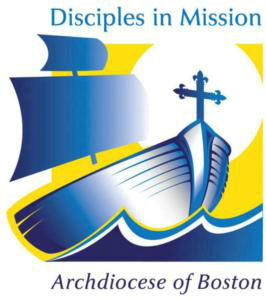Planning for vocations
When speaking about Disciples in Mission, the pastoral plan for the Archdiocese of Boston, vocations are always part of the conversation. Disciples in Mission asks each collaborative to prepare a local pastoral plan that will chart the direction for that particular collaborative. Over the course of three years, the pastor, collaborative leadership, councils, and parishioners will monitor progress to make sure that the collaborative is doing its best to live out what they set forth in their plan. The local pastoral plan is unique to each collaborative, reflecting their context, needs, and gifts. Each plan must contain three pastoral priorities, one of which focuses on promoting vocations to diocesan priesthood. Father Daniel Hennessey, director of vocations for the archdiocese, is encouraged by the great potential provided by Disciples in Mission to build a culture of vocations and create environments in parishes where priestly and religious vocations will flourish. Father Hennessey says that this is more than just offering programs. Infusing a genuine culture of vocations into every aspect of parish life requires a concerted effort.
Father Hennessey was ordained in 2002 and soon found his niche in priestly vocation work. In 2004 he was appointed assistant director of the vocations office and one year later, named director. Describing vocations today, Father Hennessey observes that, "God is blessing us in a way different than the way he has blessed us before. In the past, the majority of men entering the diocesan seminary were born and raised in the Archdiocese of Boston. Now, there is a wider mix." The total number of vocations has increased over the past 10 years but there is a great deal of untapped potential in the local Church -- the parishes of the archdiocese. The response from young adults and college students is encouraging, but again, "there is still room for growth."
A culture of vocations is not restricted to discernment of priestly or religious vocations. Father Hennessey sees it as something that will bring all people to consider the big question: "What is God's path for me? Why am I here?"
He continues, "When we start from that perspective -- 'What is my special calling?' -- our whole mindset revolves around, 'How do I get to heaven?'"
We are all given the universal call to holiness, and within that, "everyone, from a young age, should be asking: 'What does God want me to do with the life He has given me?'"
Last year Father Hennessey participated in a summit on vocations to the priesthood held at Boston College. The summit examined vocation discernment and the impact of higher education on vocations to priesthood and religious life. The summit was built on research and assessments conducted by the Center for Applied Research in the Apostolate (CARA). Cardinal O'Malley gave opening remarks affirming the importance of the gathering.
Senior research associates at CARA, Mark Gray and Mary Gautier, who have worked with the United States Conference of Catholic Bishops, shared their research. Their presentations revealed interesting statistics and thought-provoking findings that underscore the importance of making vocations to the diocesan priesthood a vital part of local pastoral plans.
Dr. Gray began by asserting that, "There are too few Catholics who realize they play an important role in ensuring that priests can be there now and in the future." Parents, parishes and parishioners, faithful Catholics, must look for, identify, and reach out to potential candidates and ask the vocation question. Statistics support the positive results of simply raising the possibility: "Respondents (men who entered the seminary) who have one person encouraging them are nearly twice as likely to consider a vocation as those who are not encouraged. The effect is additive. Respondents who had three persons encourage them would be expected to be more than five times more likely to consider a vocation than someone who was not encouraged by anyone." (A summary of the summit with a link to reports is available at www.bc.edu/offices/fopa/priesthoodsummit.html)
Father Hennessey says, "We are a sacramental Church. God works the sacraments through the priest. We make no excuses about that; we rejoice in that. It is all instituted by God and the Church is the custodian of this reality." The vocation priority in the local pastoral plan can, with God's grace, provide more laborers for the harvest.
Susan Abbott is Coordinator of Parish Outreach for the Archdiocese of Boston's Office of Pastoral Planning.
- SUSAN ABBOTT IS EVANGELIZATION ASSOCIATE, OUR LADY OF GOOD VOYAGE SHRINE.



















